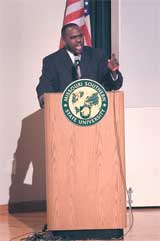King’s dream speech updated for present

Leon Williams, director of intercultural affairs at Buena Vista University, was the MLK Day keynote speaker on Jan. 17.
During the events on Dr. Martin Luther King, Jr. Day Jan. 17 at Missouri Southern, Leon Williams, director of intercultural affairs at Buena Vista University in Storm Lake, Iowa, addressed the students about King’s message in a speech titled “Shattered Dreams.”
He emphasized the issues of discrimination and injustice that still plague this country.
For Southern’s King celebration activities, Williams gave his interpretation of what King would say if he were here today.
While dressed in attire similar to that of the late civil rights leaders and imitating King’s style of speaking, Williams reminded the students this country still needs major reform before declaring everyone free and equal.
“Most of us love our country, but are not loved by our country,” Williams said. “We cannot live with prejudice, half truths, and propaganda.”
Williams believes there is an absence of knowledge about current issues in this country. For eight years he studied King and decided the best way to grab everyone’s attention is by bringing life back to King’s message.
“There are many people who missed out on the opportunity to be under the direction of such a moral leader,” he said. “We must go back to listening to the words of those with a significant impact because we are nowhere near where we need to be.”
Williams believes everyone has not always been welcoming to his message. He said the apprehension and criticism comes from his ability to challenge Americans to have a critical conscience.
“I address the issues that are not being addressed,” he said. “This is not a ploy for Negro sympathy, but a greater issue. People like to parade around because of the success in America, but poor education
systems, homelessness, incarceration, racism, sexism and ageism still exists.”
He said he was appalled by the fact today it is easier to attain a firearm than it is to attain computer resources. He found it even more appalling at one time it took a community to raise a child, but now the child appears to be running the community.
Students seemed to enjoy the fact Williams expanded on Dr. King’s message,” said Seafha Blount, senior biology major. “I liked the present day aspect of it. He did not just repeat Dr. King’s words, but he addressed all types of diversity, not just race.”
Alumni Robert Moss was more impressed by William’s method of speech.
“He was different and not like your traditional speaker,” Moss said. “He really made Dr. King come to life.”
Chris Robotham, junior psychology major, said he believes William’s message needed to be touched upon today.
“Every man and woman needs to be in the presence of a speaker like that to gain knowledge,” he said, “and become aware of what is happening around them.”
Like King, Williams still stressed the importance of non-violence. He believes because his Christianity guided King, no other approach was necessary. He suggested everyone stand up to the violations of human indignity.
Williams said sitting back in our chairs and doing nothing is only contributing to the problem. Even if necessary, Williams encouraged everyone to be “sacrificial victims suffering for the cause.”
While searching for a speaker for this year’s events, Julie Blackford, director of student activities, said once she saw William’s tape she knew he would be a good fit.
While most people stayed at home, Southern students were involved with activities that celebrated the spirit of King.
“Everyone enjoys a holiday off, but you do not want to lose the essence of what the day is all about which is embracing diversity and tolerance,” Blackford said.
When not playing the role of a modern day King, Williams does volunteer work for the Habitat for Humanity and also works in after school tutoring and mentoring programs. He also does research on poverty issues in local communities
Williams has a list of other speeches to his credit including “Outside the Circle,” Methods of Culturalism,” and “The Only Life I Know – Street Life.”
Your donation will support the student journalists of Missouri Southern State University. Your contribution will allow us to purchase equipment and cover our annual website hosting costs.



























